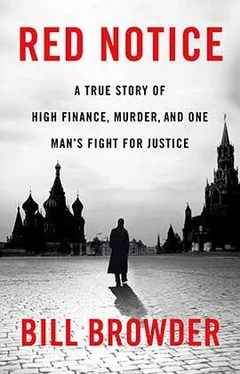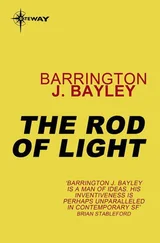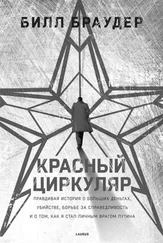But from that moment on, nobody ever touched me again at the Whiteman School.
I spent the whole year there and learned about all sorts of things I’d never known. I started smoking cigarettes, sneaking out at night, and bringing hard alcohol back to the dorms. I got into so much trouble that I was expelled at the end of the year. I returned to my family in Chicago, but I was not the same Billy Browder.
In my family, if you weren’t a prodigy, then you had no place on earth. I was so far off the rails that my parents didn’t know what to do with me. They sent me to a string of psychiatrists, counselors, and doctors to try to determine how I could be «fixed». The more this went on, the more forcefully I rebelled. Rejecting school was a good start, but if I really wanted to upset my parents, then I would have to come up with something else.
Then, toward the end of high school, it hit me. I would put on a suit and tie and become a capitalist. Nothing would piss my family off more than that.
The only problem was that since I was such a poor student, every university I applied to rejected me. Only after the intervention of my high school’s guidance counselor did I get a place at the University of Colorado in Boulder on appeal. While barely getting into Boulder was humiliating, I recovered pretty quickly when I realized the school had been ranked as the number one party school in the country by Playboy magazine.
Based on countless viewings of the movie Animal House , I decided that if I was going to go to a party school, I might as well do it right and join a fraternity. I pledged the Delta Upsilon fraternity and, after the requisite hazing, was accepted as a member. Everyone had a nickname there — Sparky, Whiff, Doorstop, Slim — and mine, on account of my curly, black hair, was Brillo.
Being Brillo was fun, but after a few months of too much beer, chasing girls, ridiculous pranks, and watching countless hours of sports on TV, I started to think that if I kept it up, then the only kind of capitalist I was going to be was the kind who collected tips as a parking lot attendant. It all came to a head when one of my fraternity brothers, and someone I idolized, was caught robbing the United Bank of Boulder to fund an out-of-control coke habit. After he was sentenced to a long stretch in federal prison, I had something of a wake-up call. I realized that if I kept it up, then the only person who would suffer from this particular form of rebellion would be me.
From that moment forward I stopped partying, spent every night in the library, and began to get straight As. At the end of my sophomore year, I applied to top universities around the country and was accepted to the University of Chicago.
I worked even harder at Chicago, and my ambition grew. But as I approached graduation, I felt an overriding need to figure out what I was going to do with my life. How was I going to go about being a capitalist? As I mulled this over, I came across an announcement for a lecture by the dean of the graduate business school. Since my plan was to go into the business world in some capacity, I decided to attend. The speech he gave was about the career paths of Chicago MBA graduates, all of whom seemed to be doing important things and getting paid well to do them. Business school, it seemed, was the obvious next step for me.
According to the dean, the best way to get accepted at one of the top business schools was to get into one of the two-year pre-MBA programs at McKinsey or Goldman Sachs, or at one of the twenty-five other firms with similar programs. I bombarded all of them with letters and phone calls asking for a job. But of course it wasn’t as simple as that, because every other college senior with similar ambitions was doing the exact same thing. In the end, I received twenty-four rejection letters, along with a single offer from Bain & Company in Boston, one of the top management-consulting firms in the country. It wasn’t clear how I’d slipped through their filter, but somehow I had, and I grabbed their offer with both hands.
Bain chose students with top grades from good schools who were ready to work sixteen hours a day, seven days a week, for two years. In return, they promised you would get into one of the top business schools in the country. There was a rub that year, though. Bain’s business was growing so quickly that they needed to hire 120 smart «student slaves» instead of just twenty, like all the other firms running two-year pre-MBA programs. Unfortunately, this ruined the implicit deal Bain had with the business schools. These schools did indeed like to admit young consultants from Bain, but they also liked McKinsey, Boston Consulting Group, Morgan Stanley, Goldman Sachs, and dozens of other sweatshops for ambitious young capitalists. So in the best case, these schools could accept only twenty people from Bain, not the full 120. In essence, Bain was offering the opportunity to work your fingers to the bone for $28,000 a year, and your reward was a 16 percent chance, at best, of getting into Harvard or Stanford.
The resulting business school application process created a crisis for all of us at Bain. We eyed each other suspiciously for weeks, trying to figure out how we were going to differentiate ourselves from one another. I certainly wasn’t better than my classmates. Many had gone to Harvard, Princeton, or Yale, and many had better performance reviews than me at Bain.
But then it dawned on me. My colleagues may all have had better résumés, but who else was the grandson of the leader of the Communist Party of the United States? No one else, that’s who.
I applied to two schools, Harvard and Stanford, and told them my grandfather’s story. Harvard was quick to reject me, but amazingly, Stanford said yes. I was one of only three Bain employees accepted to Stanford that year.
In late August 1987, I packed up my Toyota Tercel and drove across the country to California. When I got to Palo Alto, I turned right off El Camino Real onto Palm Drive, which led up to Stanford’s main campus. The road was lined with twin rows of palm trees ending at Spanish-style buildings with terra-cotta roofs. The sun was shining, and the sky was blue. This was California, and I felt as if I were arriving in heaven.
I soon learned that it was heaven. The air was clean, the sky was blue, and every day felt as if I were living in some kind of paradise. Everyone at Stanford had killed himself to get there, working eighty-hour weeks at places like Bain, poring over spreadsheets, falling asleep at their desks, sacrificing fun at the altar of success. We were all strivers who had competed against one another for the right to be there, but once we got there, the whole paradigm shifted. Stanford didn’t allow you to show your grades to potential employers. All hiring decisions were made on the basis of interviews and past experience. The upshot of this was that the normal academic competition was replaced with something that none of us expected: an air of cooperation, camaraderie, and friendship. I quickly realized that success at Stanford wasn’t in doing well there, but rather just being there. Everything else was gravy. It was for me, and for every one of my classmates, the best two years of our lives.
Aside from just enjoying the experience, the other purpose of Stanford was to figure out what to do after business school. From the moment we arrived, my classmates and I spent nearly every day going to corporate information sessions, brown-bag lunches, evening receptions, dinners, and interviews trying to choose which job, among thousands available, was the right job.
I went to a standing-room-only Procter & Gamble brown-bag lunch and watched three female junior marketing executives in pleated blue skirts, white shirts, and floppy ties talk in excited corporate jargon about all the fantastic ways they sold soap.
Читать дальше












